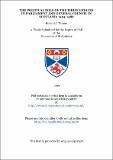The political role of the Three Estates in Parliament and General Council in Scotland, 1424-1488
Abstract
This thesis examines the political role of the three estates in the Scottish parliament and general council between 1424 and 1488. Previous histories of the Scottish parliament have judged it to be weak and constitutionally defective. By placing each meeting of the estates within the context of political events, examining the frequency of meetings, identifying previously unknown parliaments, and studying those who attended and sat on its committees, a more detailed picture of parliament's role and influence has been created. A broadly chronological approach has been used in order to place parliaments in the context of the time in which they sat. Chapters 1 and 2 examine parliament between the return of James I from England in 1424 and 1435 and show the opposition he faced regarding taxation and the developing noble and clerical resentment to attempts to extend royal authority in the secular and ecclesiastical spheres. Chapters 3 and 4 discuss the crisis in parliament and general council between 1436 and James I's death, its role in the establishment of a new minority government, and the interaction between the Crichton, Livingston and Douglas families between 1437 and 1449. Chapter 5 examines James IPs use of parliament as a tool against the Black Douglases between 1450 and 1455, while Chapter 6 shows parliament's ability to exert influence over royal lands and possessions and to criticise royal behaviour from 1455 to 1460. Chapter 7 shows the role of factions in parliament in the minority of James III, and their ability to undermine the government. Chapters 8, 9 and 10 discuss the campaign of criticism against James III in the 1470s, the parliamentary crisis that faced him in 1479-82, and the greater royal control exerted in the 1480s. Chapter 11 examines the lords of the articles between 1424 and 1485 and concludes that the committee was not, as has formerly been suggested, a royal board of control. In conclusion the Scottish parliament is judged to have played a leading role in political affairs, providing a forum in which the estates were able to criticise, oppose and defeat the crown over a broad range of issues.
Type
Thesis, PhD Doctor of Philosophy
Collections
Items in the St Andrews Research Repository are protected by copyright, with all rights reserved, unless otherwise indicated.

